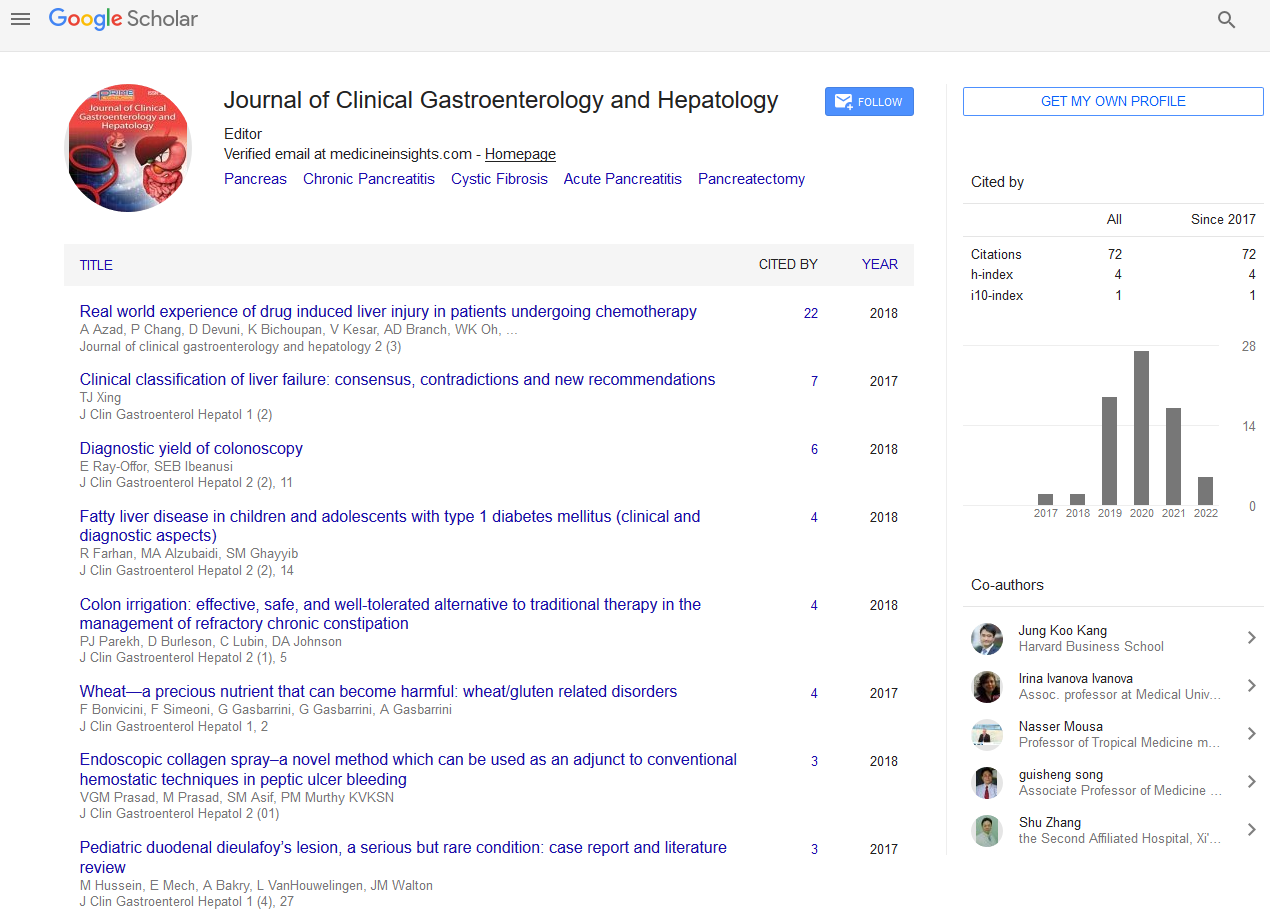Perspective - (2023) Volume 7, Issue 3
Corrosive Blockers as Receptor H-2 Blockers Reduce the Amount of Corrosive that Enters your Digestive Tract
Yungeng Qi*
Department of Materials Science and Engineering, Jiangsu University of Science and Technology, China
*Correspondence:
Yungeng Qi,
Department of Materials Science and Engineering, Jiangsu University of Science and Technology,
China,
Email:
Received: 31-May-2023, Manuscript No. IPJCGH-23-16803;
Editor assigned: 02-Jun-2023, Pre QC No. IPJCGH-23-16803;
Reviewed: 16-Jun-2023, QC No. IPJCGH-23-16803;
Revised: 21-Jun-2023, Manuscript No. IPJCGH-23-16803;
Published:
28-Jun-2023, DOI: 10.36648/2575-7733.7.3.23
Introduction
Gastric ulcers, otherwise called stomach ulcers, are serious injuries that show up on the stomach’s coating. Ulcers can also affect the part of the intestine above the stomach. These are known as ulcers of the duodenum. The stomach and duodenal ulcers are also referred to as peptic ulcers. This information has an effect on both parties. At the point when gastric corrosive destroys your stomach’s defensive covering, you get a stomach ulcer. The corrosive makes fresh injuries that might drain and cause distress in the stomach. Stomach ulcers are a symptom of peptic ulcer disease. Albeit treatable, they ought to be viewed in a serious way since they are normal.
Description
It is feasible for stomach ulcers to recuperate on their own in certain occurrences. However, it is more common to experience ulcer symptoms that persist for a number of weeks or months. Deficient conclusion and treatment of stomach ulcers additionally improve the probability of their repeat. In spite of the fact that they are unprecedented, stomach ulcer-related difficulties can be very troublesome and, surprisingly, lethal. The most pressing issues include: Draining at the ulcer’s site. Hole in the stomach lining at the ulcer’s opening. The most generally perceived justification behind ulcers is pollution of the stomach by microorganisms called Helicobacter pylori. The majority of people with peptic ulcers have these bacteria in their digestive tract. To determine if you have an ulcer, this test looks directly inside your stomach. A thin, flexible endoscope with a camera is inserted into your stomach and the duodenum, the first part of the small intestine. It is recommended to arrange gastric ulcers as follows: Type I, certifiable gastric ulcers; ulcers of the duodenum and stomach of type II; ulcers of type III in the pylorus and suprapylorus; different stomach ulcers of type IV; Type V secondary gastric ulcers Peptic ulcers typically persist and can recur even in the absence of treatment for many years. The most common symptoms are: Pain in the upper, middle, or back of the abdomen is typical. The response is yes assuming you have peptic ulcer illness, which can cause duodenal ulcers in the small digestive system or stomach ulcers. These ulcers can be dealt with totally. A group of conditions is referred to as “gastritis,” and they all share one thing in common: The lining of the stomach becomes inflamed. Contamination with the very bacterium that causes most stomach ulcers or successive utilization of specific pain relievers are regularly the reasons for gastritis’ aggravation. Corrosive blockers, also known as receptor H-2 blockers, reduce the amount of corrosive that enters your digestive tract, alleviating gastritis symptoms and facilitating healing. Available by cure or over the counter, destructive blockers consolidate famotidine Pepcid cimetidine Tagamet HB and Nizatidine Axid AR.
Conclusion
There are expectation strategies for gastritis. However, in order to quickly experience relief, a person will probably need to take over-the-counter medications that either reduce or block stomach acid. Examples include calcium carbonate Tums and omeprazole Prilosec. With a splash of low-fat milk or non-dairy creamer, some people with mild gastritis can tolerate weak tea or coffee, but you should avoid caffeine. Herbal tea, non-dairy milk, low-sugar and acidic juices, and water are your best options.
Citation: Qi Y (2023) Corrosive Blockers as Receptor H-2 Blockers Reduce the Amount of Corrosive that Enters your Digestive Tract. J Clin Gastroenterol Hepatol. 7:23.
Copyright: ©2023 Qi Y. This is an open-access article distributed under the terms of the Creative Commons Attribution License, which permits unrestricted use, distribution, and reproduction in any medium, provided the original author and source are credited.

